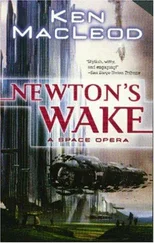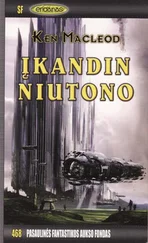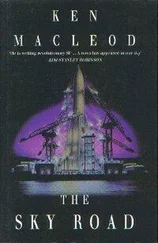He wheeled. The blue of the Broad Channel refreshed his sight as much as the high air cooled his skin. Sullied by steamship smoke, spotted by the black of sails, the Channel was still an immense and soothing body of water which even at this height went clear to the horizon. Darvin wondered whether Orro ever climbed high enough — thousands of feet — to see all the way across it to the Realm of Gevork. It struck him as unlikely. Nostalgia, to the best of Darvin’s knowledge, was not among his colleague’s pains. Glancing upward, to that fancied height, Darvin noted the dark speck of a dirigible of Seloh’s Right, patient in its patrol. An obscure sense that he had trespassed troubled him. It was not a feeling he associated with, or wished to have in, the sky. He dropped.
From the top of his downward spiral, Five Ravines looked like a freak regular woodland, a vast elaboration of an abandoned enclosure on the grasslands where trees sprouted because their saplings could not be cropped by the prey. Trees lined its streets and filled its parks and gardens: fruit trees for the most part, not so much from deliberate planting as from seeds spat or (in ruder times) shat by people on the wing. Trudges hauled carts along the streets, here and there making way for the noisy, fuming motor vehicles. The town was divided by the watercourses of the rivers from the ravines, united by its roads and bridges and sky-wires. The ravines converged, the streams diverged; from a sufficient height they showed a pattern like outspread wings. Expensive roosting and offices covered the verdant cliffs of the ravines; cheaper and more recent buildings crowded the riversides to the shore, like wooden gulleys. Among such were the university’s faculties and departments; its charter, centuries old, was younger by far than that of the borough.
Darvin’s own office was in the Faculty of Impractical Sciences, whose five-floor wooden building was little different from the town roosts on either side of it. Darvin skimmed the topmost branches of one of the street’s trees and swooped to the fourth-floor landing platform signboarded University of Five Ravines. Department of Astronomy . Sweating and panting from his exertions and the renewed heat, he strolled to the entranceway’s array of wicker baskets and checked his post. A broad and thick package awaited him. He hefted it with satisfaction as he hurried to his room. An eight-nights’ worth of photographic plates, despatched from the observatory in the high desert. Each night usually afforded at least eight plates. Checking them all could take up most of his working time for eight days, and then the next set would arrive by the cable-car post, just as impatiently awaited.
A year’s accumulation of such packages and their plates made up a small proportion of the clutter in his room. First things first: he set the pot over the brazier and chewed some leaf while waiting for the tea to brew. The leaf relaxed his muscles and cleared his head, and the tea took away the aftertaste. He gazed absently at the old wall poster of the solar system, given away in a special issue of a children’s popular science magazine: the picture that had first inflamed his interest in astronomy.
On the left of the picture was the Sun Himself, the smiling king. A little to His right was the Fiery Jester, so close to the Sun that a solar prominence sometimes smacked him about the head. Then, after a gap, was Ground, the Mother, with Her attendant maids, the two moons. But though Ground was without doubt humanity’s Mother, Who fed Her children with the milk of Her waters and with a rich variety of fruit and prey, She was not (except in some backward heathen mythologies) the Sun’s consort. She was, it was sometimes speculated, His Daughter, or (more daringly, in the racy poems of the Dawn Age) His illicit lover. It was the third planet, more than twice as far from the Sun as Ground, that was the undisputed Queen of Heaven. Even on the diagram, which was — as the inevitable small-print caption cautioned — Not To Scale, the Queen’s diameter was three times that of Ground, and this was no exaggeration. In real life Her blue-green light far outshone anything in the night sky. In the past five centuries telescopic inspection had revealed that the planet was blue with green patches which had at first been thought to be continents, but whose shifting coastlines and relative positions made more likely to be floating mats of vegetation. By imaginative analogy with floating islands, on which entire complex ecosystems could build up from an initial conglomeration of weeds and logs, the Queen’s floating continents had been planted with jungles and populated with all manner of creeping and flying things. How many fanciful tales had been told of the strange beasts and beings of that world! It was as sad as it was certain that they were false. After the telescope had come the spectroscope, and while it had revealed that the Queen was indeed a world of water, it had indicated that the floating mats were little more than thin layers of algal scum.
Far out beyond the Queen was the Warrior. What intuition the ancient cliff-men had had, in so naming it, neither Darvin nor anyone else could guess — perhaps their eyesight had been better than those of the men of this latter day — but the telescope had confirmed that the Warrior had the appearance of being winged, and of clutching two bright weapons. Here on the diagram, this mythical representation was outlined beside the astronomical reality: a ringed gas giant, more than thirty times the diameter of the Queen, and within its ring two glinting, flinty-looking moons. Between the Queen and the Warrior marched a ragtag army of small worlds. The largest of them, a few hundred miles across, had been discovered not long after the invention of the telescope. It had been given the name of the Exile, and it still held the title of a planet, but was now classed among the many smaller asteroids — the Camp-Followers, to give their poetic name — discovered in its wake.
What planets, if any, roamed the skies beyond the Warrior’s octades-long orbital patrol was not known. Darvin had spent the past two years, and was willing to spend many more, in finding out.
He pushed aside the teacup, spat the wad of leaf out of the open window, and with his thumb-claw ripped open the package and eased out the contents: sheets of transparent acetate, separated by sheets of thin paper. He lifted the top sheet of acetate and held it up to the light from the window. A number and a date were written in tiny characters along the side. The plate was clear, but spattered with a mass of black dots of varying size and intensity. He turned over all the plates and their protective sheets one by one, double-checking their dates and numbers, and found them in order. Sixty-four altogether, as usual. He arranged sixteen along the side of a table, eight for the first night, eight for the second, in pairs matched by area of sky, and took the first pair to the bulky apparatus that filled a quarter of his room.
The blink comparator looked, in a bad light, like some absurd, weighty abstract of a human form: two metal-framed translucent white platforms with a black metal crosspiece projecting from the sides like wings, their accompanying adjustment and positioning rods like forearms, and a cluster of knobs, levers, and eyepieces on the top of the central pillar like asymmetric features on a deformed face. Behind that face was the intelligence of the thing, a mirror that flipped the view through the eyepiece from one platform-mounted plate to the other in rapid succession, over and over. Any change in an object’s position, from one night to the next, could be detected by its apparent jump. Such was the principle. In practice the job was difficult; aligning the plates so that the stars didn’t all jump at once was a finicky matter, and once that was done many passes were necessary to make sure nothing — among the thousands of separate points of light in each long-exposure plate’s field — had been missed. Even then Darvin could not be sure. Any world beyond the Warrior — given that perturbations in the Warrior’s orbit were themselves minute and disputed — was certain to be a small one, and its proper motion tiny. So far, everything that had jumped out at him had turned out not to be that distant and hypothetical seventh planet. Eliminating known planets and asteroids should have been routine, but was not; Darvin had rediscovered several known asteroids, whose orbits had long since been calculated but whose current position no one bothered to track, and had added three new ones to the catalogue. His colleagues called them Darvin’s Little Bastards.
Читать дальше












